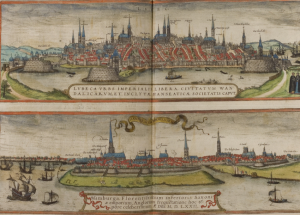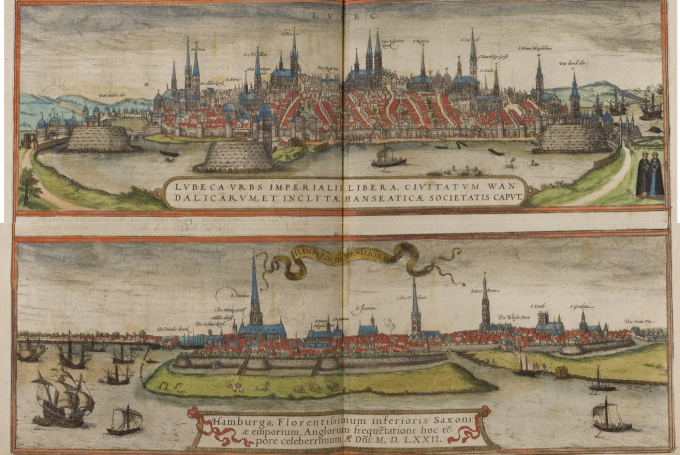The German cities of Hamburg and Lübeck have an interwoven and eventful history. Whereas Lübeck offers an example of how dominant cities may become unattractive and decline when they end up serving the interests of a privileged few and refuse to change, Hamburg serves as a tale of how cities can reinvent themselves by changing with the times.

The cities of Hamburg and Lübeck in the north of Germany are just 65 kilometers (40 miles) apart. Yet, given the shape of the Jutland peninsula, Hamburg lies on the Atlantic coast, while Lübeck lies on the Baltic.
The two cities have an interwoven and eventful history. Both Hamburg and Lübeck were members of the medieval Hanseatic League. This league was a federation of merchant guilds—an association of wholesale traders that had a privileged regional monopoly over trade—that traded across northern Europe. These guilds were the dominant way of doing trade across medieval Europe.
Within the Hanseatic League, Hamburg and Lübeck were sprawling cities. While Lübeck served as the chief Baltic entrepôt of Europe, Hamburg provided the Hanseatic League with access to the Atlantic. Between the two cities lay the elaborate Elbe river and canal system to facilitate transport of goods. Lübeck prided itself on being the Queen of the Hanseatic until the fifteenth century, while Hamburg was its smaller, allied partner.
Times became rocky for the Hanseatic system in the fifteenth century. This was in part due to the rise of the Dutch, who were once beneficiaries of trade with the Hanseatic but were now the league’s seafaring competitors. Before the arrival of the Dutch, almost all trade to and from the Baltic passed through Lübeck. Likewise, Hamburg benefited from being the sole major Atlantic port of the Hanseatic. The link between Lübeck and Hamburg was a crucial route for trade in the north. However, the Dutch began to trade with the Baltic by navigating around the Jutland peninsula and through the Sound (Øresund). Thus, the Dutch soon began to reach the Baltic shores without the need to visit Hamburg and/or Lübeck. This competition from the Dutch disrupted the two cities’ centuries-old domination over trade between the Atlantic and the Baltic.
How did the two cities respond? Differently. Lübeck responded to this competition with the Dutch by giving more privileges to its own merchants and by leading a persistent attempt to disrupt the Dutch trade through the Sound (which included taking part in the Dano Hanseatic War of 1426-35 and the Dutch Hanseatic War of 1438-41). In contrast, while Hamburg initially was an ally to Lübeck in its resistance to the Dutch (including in the two wars), it eventually began to diverge from its partner in the sixteenth century. Hamburg opened trade to all locals and non-locals, and instead of resisting this rising Dutch trade, it “adapted itself perfectly to the changing situation” and moved toward an open system of trade that welcomed diverse merchants (Dollinger, 1970, p. 355). Thus, Hamburg internally reformed, and the centuries-old privileges that a few of its merchants enjoyed declined, especially in the sixteenth century. This made a difference.
Hamburg over time became integrated with the Atlantic trading system to its west, and expanded as a major Atlantic entrepôt of northern Europe. Traders from around Europe could trade in Hamburg, and this attracted more merchants and more trade. And what about Lübeck? While the traditional traders held onto their privileges in the city, Lübeck as a whole declined slowly but persistently, especially after the sixteenth century.
Dollinger (1970, p. 372), recounting the decline of Lübeck in his classic book The German Hansa, wrote:
The spirit of conservatism, which seems to have been particularly strong in Lübeck, was one of the main causes of Hanseatic weakness in and after the fifteenth century…. As foreign competition intensified, the only remedy proposed was an even stricter regulation of trade. In striving to limit the business operations of foreigners in her domain, the Hansa hindered the activities of her own merchants, forbidding them to go into partnership with foreigners or to trade on credit.
This contrasts with Hamburg, about which Dollinger (1970, p. 356) wrote:
To a large extent the greatness of Hamburg was the work of foreign merchants. They came in large numbers and they stayed. The town did all it could to facilitate their business…. Foreigners were authorized to trade freely among themselves and to enter into partnerships with Hamburg merchants.
One can make a simpler argument that Lübeck could not compete with Hamburg in the Atlantic trade era, simply because it was not an Atlantic city. Yet, the story seems to be more nuanced. It is indeed true that not being directly on the Atlantic coast was a hurdle for Lübeck that Hamburg didn’t have. Geographical differences must have played a role in the institutional divergence between Lübeck and Hamburg. Conditions were more favorable for Hamburg to develop open markets of the kind that had developed in its Atlantic neighborhood, like in Amsterdam and Antwerp (Raj, 2017).
Yet, it was the closed and protective nature of trade in Lübeck that was key to its decline (read Lindberg, 2009 for a look at the political economy of Lübeck, where merchant guilds held a lot of political influence and used it to maintain privileges). Lübeck ceased to be an attractive destination for new merchants, as it protected its existing merchants from foreigners and as competition increased from trade through the Sound. It isn’t as if Lübeck could not have competed or cooperated with Hamburg (and with the Danes who controlled the Sound) and remained a key player in the emerging Atlantic trading system.
After all, Lübeck was the larger and the richer of the two cities, it was the chief Baltic entrepôt that had elaborate waterways to the Atlantic, and in the fifteenth century it was still the Queen of the Hansa with significant political clout. It could have welcomed traders from the Atlantic and the Baltic, and remained an international trading hub, instead of ceding influence to its close and smaller neighbor, Hamburg. Yet, Lübeck chose to use its clout to protect its own privileged merchants “in a vain attempt to stifle unguilded Dutch and English competition” (Ogilvie, 2011, p. 87). It also continued using its clout to restrict trade of Dutch merchants through the Sound (e.g., in 1470), but failed in its attempts, as other Hanseatic towns (especially on the eastern and western flank) refused to cooperate (Lennart, Frankot, and Brand, 2007, p. 5). Hence, Lübeck attempted to conserve the old ways of Baltic trade via privileged monopolies and restrictions, while “Hamburg repealed the monopolies of its local merchant guild, and permitted non-locals to trade freely among themselves and form partnerships with locals” (Ogilvie, 2011, p. 87).
While historical anecdotes should not be used as conclusive evidence, they can serve as cautionary tales. In this case, Lübeck serves as an example of how dominant cities may become unattractive and decline when they end up serving the interests of a privileged few and refuse to change. In contrast, Hamburg serves as a tale of how cities can reinvent themselves by changing with the times and by investing in pro-market institutions that make them attractive centers for trade and commerce for a broad and diverse base of potential traders.
Bibliography
Bes, Lennart, Edda Frankot, and Hanno Brand. 2007. Baltic Connections: Archival Guide to the Maritime Relations of the Countries Around the Baltic Sea (including the Netherlands) 1450-1800. Vol. 36, Brill.
Dollinger, P. 1970. The German Hansa. Stanford University Press.
Lindberg, Erik. “Club goods and inefficient institutions: why Danzig and Lübeck failed in the early modern period.” The Economic History Review 62, no. 3 (2009): 604-628.
Ogilvie, S. 2011. Institutions and European trade: Merchant guilds, 1000–1800. Cambridge University Press.
Raj, P. 2017. “Origins of Impersonal Markets in Commercial and Communication Revolutions of Europe.”
Disclaimer: The ProMarket blog is dedicated to discussing how competition tends to be subverted by special interests. The posts represent the opinions of their writers, not those of the University of Chicago, the Booth School of Business, or its faculty. For more information, please visit ProMarket Blog Policy.








